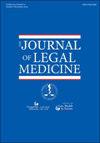Ethical Dilemma of Physicians Informing Patients of Foreign Organ Transplant Alternatives
IF 0.8
4区 医学
Q3 LAW
引用次数: 0
Abstract
Ethical Dilemma of Physicians Informing Patients of Foreign Organ Transplant Alternatives Sean Poole, OMS-II; spoole3@student.touro.edu Benjamin Selander, OMS-II; Touro bselande@student.touro.edu Joseph P. Hardy, MD, Associate Dean for Clinical Education Weldon Havins, MD, JD, LLM, FCLM, Emeritus Professor Touro University Nevada College of Osteopathic Medicine, NV Ever since the introduction of transplant surgery in the latter half of the 20th century, organ transplantation has improved the lives of thousands of people around the world. However, the demand for organs is steadily rising while the supply remains limited. This inevitably leads well-to-do individuals, placed on lengthy organ waiting lists, to seek organ transplants abroad in less ethical and less legal ways. Many procure these organs in China, where it is believed that non-consenting Falun Gong practitioners are persecuted, placed in detention centers or labor camps and illegally harvested for their organs. There are also issues of illegal brokers taking advantage of vulnerable individuals in developing nations, such as the Philippines and Moldova. However, regardless of how the organs are acquired, “organ tourists” are met with virtually no legal repercussions. The increasing need for organs has created a global issue. This practice, called “organ tourism”, has been condemned, but not criminalized, by the greater international community in the Declaration of Istanbul, created in 2008 and supported by over 150 countries. Though internationally condemned, engagement in “organ tourism” has seen an increase in recent years. There are currently no U.S. laws prohibiting organ tourism, nor are there any mandates requiring physicians to report patients who have participated in organ tourism. Therefore, physicians are faced with an ethical dilemma; in what capacity, if any, to advise their patients regarding organ transplantation abroad. This review utilizes the Army’s 7 Steps in Problem Solving Model to provide a concise and conclusive framework to determine if there exists an ethical obligation for physicians to advise their patients of foreign transplant alternatives. By following the Army’s 7 Steps in Problem Solving Model, certain guiding criteria are established, such as: non-judgmental regard and fiduciary responsibility for patients who return with transplanted organs, deterring hopeful transplant patients from involving 2021 American College of Legal Medicine JOURNAL OF LEGAL MEDICINE 2021, VOL. 41, NO. S1, 36–37 https://doi.org/10.1080/01947648.2021.1914488 themselves in organ transplant systems engaged in crimes against humanity, and considering the greater societal impact of the benefits of organ tourism. This review concludes it is the physicians ethical duty to advise their patients of foreign options to obtain organ transplantation. However, there should be no obligation to inform patients of transplant organ systems which take part in highly unethical practices, such as those considered to be participating in crimes against humanity. Future research topics are offered and encouraged. References available upon request 37医生告知患者国外器官移植选择的伦理困境
医师告知患者国外器官移植选择的伦理困境spoole3@student.touro.edu本杰明·塞兰德,OMS-II;Touro bselande@student.touro.edu Joseph P. Hardy,医学博士,临床教育副院长Weldon Havins,医学博士,法学硕士,FCLM,荣誉教授Touro University of Osteopathic Medicine, NV自从移植手术在20世纪下半叶引入以来,器官移植已经改善了全世界成千上万人的生活。然而,对器官的需求正在稳步上升,而供应仍然有限。这不可避免地导致那些排在漫长的器官等待名单上的富裕人士,以不那么道德和不那么合法的方式在国外寻求器官移植。许多人在中国获得这些器官,据信,在那里,未经同意的法轮功学员受到迫害,被关押在拘留中心或劳教所,并被非法摘取器官。在菲律宾和摩尔多瓦等发展中国家,也存在非法经纪人利用弱势群体牟利的问题。然而,不管器官是如何获得的,“器官游客”几乎没有受到任何法律制裁。对器官日益增长的需求已经成为一个全球性问题。这种被称为“器官旅游”的做法在2008年制定并得到150多个国家支持的《伊斯坦布尔宣言》中受到了更大的国际社会的谴责,但没有被定为犯罪。尽管受到国际社会的谴责,但近年来,“器官旅游”的活动有所增加。目前美国没有禁止器官旅游的法律,也没有任何强制要求医生报告参与器官旅游的病人。因此,医生面临着一个伦理困境;以何种身份(如果有的话)建议患者进行国外器官移植。本综述利用美国陆军的“问题解决的7个步骤”模型,提供了一个简明而结论性的框架,以确定医生是否有道德义务向患者建议国外移植的替代方案。通过遵循陆军解决问题的7个步骤模型,建立了一些指导标准,例如:对移植器官返回的患者的非判断性考虑和信托责任,阻止有希望的移植患者参与2021年美国法律医学学院法律医学杂志2021,VOL. 41, NO。S1, 36-37 https://doi.org/10.1080/01947648.2021.1914488他们自己在器官移植系统中从事反人类罪,并考虑到器官旅游带来的更大的社会影响。本综述的结论是,医生有道德责任向患者推荐国外的器官移植选择。然而,没有义务告知患者参与高度不道德做法的移植器官系统,例如那些被认为参与危害人类罪的移植器官系统。提供并鼓励未来的研究课题。可索取参考资料37
本文章由计算机程序翻译,如有差异,请以英文原文为准。
求助全文
约1分钟内获得全文
求助全文
来源期刊

Journal of Legal Medicine
Multiple-
CiteScore
1.10
自引率
0.00%
发文量
3
期刊介绍:
The Journal of Legal Medicine is the official quarterly publication of the American College of Legal Medicine (ACLM). Incorporated in 1960, the ACLM has among its objectives the fostering and encouragement of research and study in the field of legal medicine. The Journal of Legal Medicine is internationally circulated and includes articles and commentaries on topics of interest in legal medicine, health law and policy, professional liability, hospital law, food and drug law, medical legal research and education, the history of legal medicine, and a broad range of other related topics. Book review essays, featuring leading contributions to the field, are included in each issue.
 求助内容:
求助内容: 应助结果提醒方式:
应助结果提醒方式:


